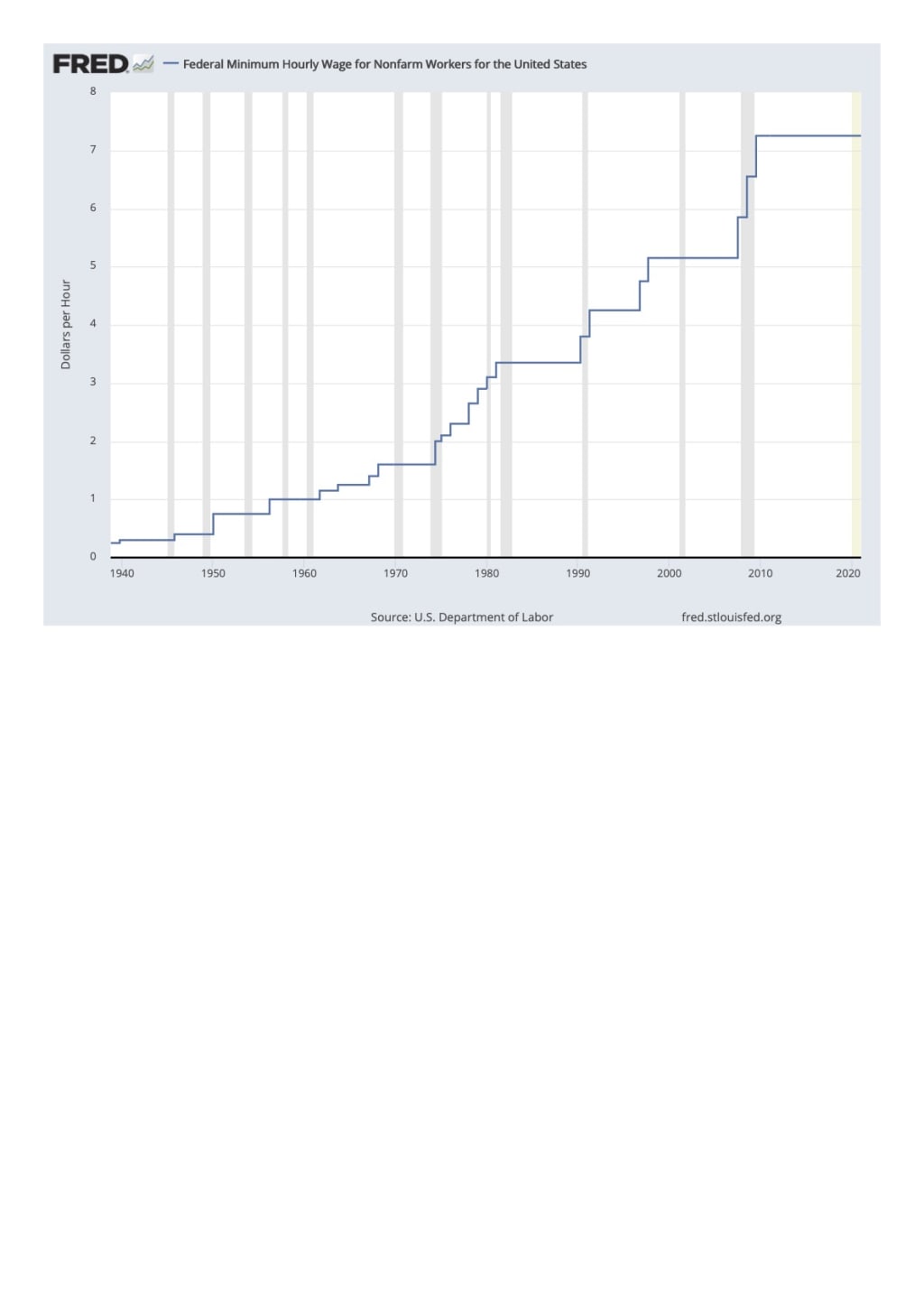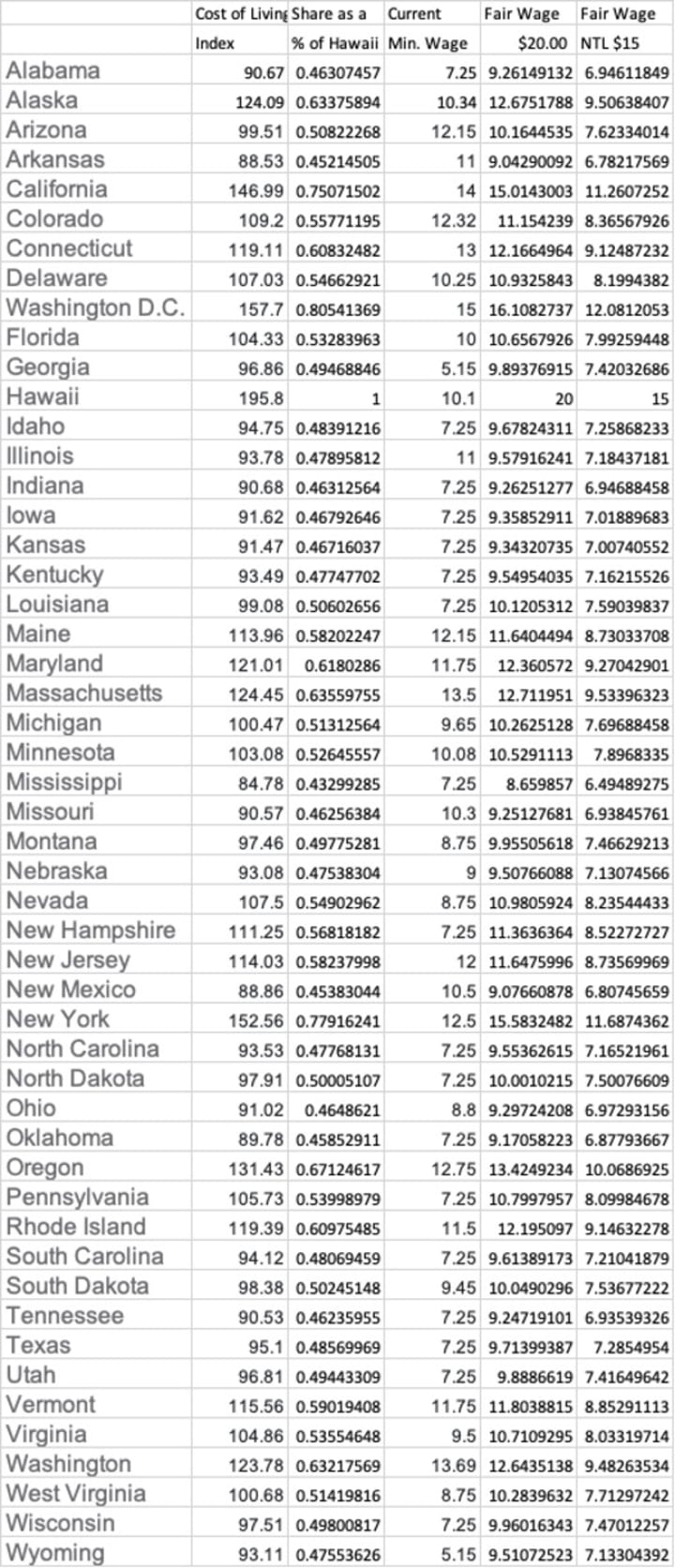How to Raise the National Minimum Wage Fairly and Avoid Massive Job Losses?
Minimum Wage

There is considerable debate about raising the National Minimum Wage to $15.00 per hour. Not surprisingly, since adjusting such wages upward on a national basis is a blunt instrument, the Congressional Budget Office (CBO) estimates that raising the national minimum wage to $15.00 per hour could result in the loss of 1.4 million U.S. jobs.
Simply put, a single national minimum wage makes little sense because the cost of living varies across all 50 States. By way of example, Hawaii has the highest cost of living (COL) of any U.S. state while Mississippi has the lowest cost of living. As a result, if we raised the minimum wage to $15.00 per hour, it would likely cause fewer if any job losses in the former state when compared to what would likely happen in the latter state!
To be sure, raising the minimum wage to $15.00 in Hawaii (up from its current $10.10) would be the equivalent of a $6.50 minimum wage in Mississippi. That means that if the minimum wage rate was raised in Mississippi to $15.00 per hour, it would be the equivalent of more than doubling the minimum wage in Hawaii after adjusting for the cost of living in both states. This strongly implies that we would likely to see more potential job losses in a state like Mississippi if the national minimum wage was raised to $15.00 per hour while a state like Hawaii would probably experience few if any job losses.
And to make this comparison even more egregious, the state of Mississippi today already pays its workers a national minimum wage of $7.25 per hour which (after adjusting for the cost of living between both states is higher than a worker would receive in Hawaii even if the minimum wage was raised to $15.00 per hour in that state! Of course, these interesting comparisons are not just limited to just to these two states. At present, Washington, DC has a minimum wage of $15.00 per hour today. If the District of Columbia adjusted that wage to the cost of living in Hawaii (if we had a national minimum wage of $15.00 per hour), it would be paying a minimum wage of $12.08 per hour.
Of course, we all know that it is not practical to lower the state minimum wage in one jurisdiction simply because it is too high on a relative basis. One simple solution might be to raise the national minimum wage to a higher level (e.g., $20.00 per hour) and then recalibrate the individual state minimum wages to incorporate the different and varying cost of living adjustments for each state to ensure that no State or jurisdiction has to lower their current minimum wage. As Table 1, reveals, if the national minimum wage level was $20.00, no state (including the District of Columbia) would have to lower their current state minimum wage rates. Even the State of California will be able to avoid having to adjust its State minimum wage downward when we set the national minimum wage at $20.00 even though that would not be the case if that wage was set at $15.00 per hour. At $15.00 per hour, the cost-of-living adjusted minimum wage in California would equal $11.26 compared to its current State minimum wage of $14.00 per hour!
Why should we take into consideration the varying COL indices between the states?
We should do this for the same reasons that we are currently pushing to raise the national minimum wage, namely fairness! Surely proposing a national policy that pays workers in some states a minimum wage that is 1.5 to 2X times what other workers receive in other states is very hard to justify. No one should forget that that the central theme behind any adjustments in the national minimum wage should always be fairness between all workers.
And while others have said that the reason for raising the minimum wage is to pay all workers a reasonable living wage --- that goal could easily be achieved using the methodology under discussion. This can be accomplished by having policymakers select a fair and optimal living national minimum wage and then adjusting that wage to each State’s cost of living index to ensure we treat all workers in a similar manner, irrespective of where they reside within the United States.
How to Minimize the Job Losses from Raising the National Minimum Wage?
It is time, that we all realize that just like all of us wear different glove and hat sizes, the national minimum wage needs to be adjusted in each and every state to reflect the actual cost of living in each individual state that can then be adjusted over time if and when the relative cost of living changes between states. No one should be surprised that if we pursue this strategy that the so called 1.4 million job losses cited by the CBO will be greatly reduced if the adjustment in the minimum wage was calibrated to the individual cost of living in each individual state. That occurs, because any increases in the minimum wage will be less dramatic in any given geographical area when the cost of living is carefully taken into account. By way of example, if we raised the national minimum wage to $15 or even $20.00, the State’s minimum wage would rise from $7.25 to $7.29 or $9.71, respectively – which would seem hardly disruptive for its small and medium sized firms and as a bonus, it would be fair after fully taking into account the cost of living in that state!
If and when policymakers decide that raising the minimum wage is a good idea --- let’ do it fairly for all workers across all geographical locations within the United States.
Table 1: Source: Bureau of Labor Statistics

About the Creator
Anthony Chan
Chan Economics LLC, Public Speaker
Chief Global Economist & Public Speaker JPM Chase ('94-'19).
Senior Economist Barclays ('91-'94)
Economist, NY Federal Reserve ('89-'91)
Econ. Prof. (Univ. of Dayton, '86-'89)
Ph.D. Economics






Comments
There are no comments for this story
Be the first to respond and start the conversation.